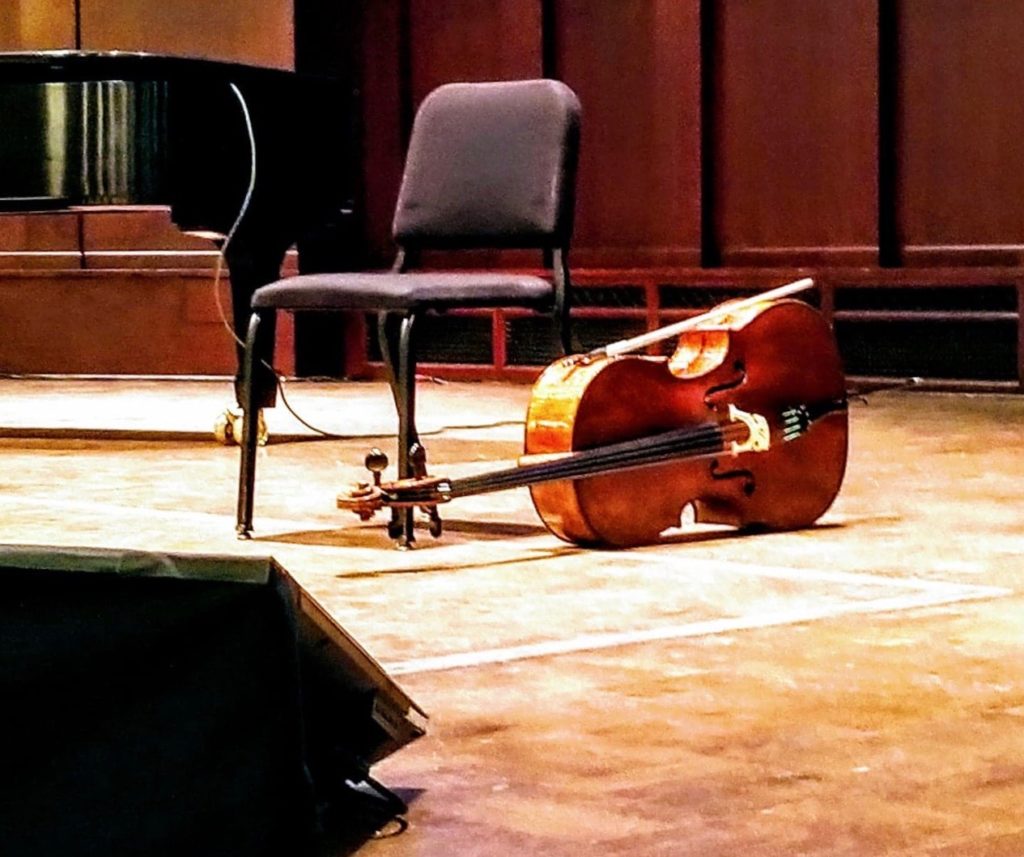By Darlene C. Carey
On the night of cellist Yo-Yo Ma’s recent appearance in Ann Arbor, the crescent moon and Jupiter had their closest pass of the year, with Saturn and Venus also visible in the night sky.
Ma’s performance before a packed house at Hill Auditorium offered a similar magical aligning of the stars, a prelude to the next day when he brought his singular warm-hearted excitement to Flint.
The famed musician’s visit to Michigan was inspired by his two-year, globe-spanning Bach Project, which began in August 2018. Ma is performing Johann Sebastian Bach’s Six Suites for Solo Cello as a catalyst for social action in his journey to 36 locations around the world; Ann Arbor and Flint being his ninth stop.

Lone cello awaiting the arrival of the master onstage at Hill Auditorium (Photo by Jeffery L. Carey, Jr.)
Ma and his team, along with community leaders, community artists and cultural denizens are striving to build partnerships “to design conversations, collaborations and performances” that will help “raise all voices,” according to Matthew VanBesien, president of the University Musical Society (UMS).
Addressing the crowd, including about 100 Flint residents and Mayor Karen Weaver, University of Michigan-Flint Provost Susan Alcock said, “Transformative connections” had already been made by Ma’s two-day initiative.
“Friendliness engendered across cultural and community groups” was the hope of bringing Ma to Michigan, and especially to Flint citizens, Alcock said.
The auditorium erupted with applause as Ma took the stage. The cellist didn’t keep the audience waiting, but began on the piano, with a subtle and fluid first segment of Bach’s Goldberg Variations. He joked he had left his cello in a taxi.
But then he said, “All of music is based on theme and variation, and I would go on to say that all of life is based on theme and variation.” Alternating between playing the piano and cello and addressing the audience, he created a story in sound.
Ma offered the idea of a “common lineage” that cultures can create and evolve through the “practice of experimentation and exploration.” Why is this important? Ma replied, “Because today we are acutely aware that nothing is more constant than change…and that can be frightening.”
He emphasized “cultural evolution” through a showcase of musical classics of Gershwin, Copland and Ellington, sampled for the audience in audio clips.
He further connected the idea of change and evolution to his own life struggle with scoliosis.
He faced uncertainty for six years about whether to get surgery on his spine; he said risking never playing again was frightening. Ma said his personal struggle made him realize and continually affirm, “to play as if it was the last time I will ever play a piece.”
What got him through the pain and eventual surgery, he said, was music. Listening to Brahm’s Piano Concert No.2, for example, he could identify with how the piano in the piece struggles against the orchestra.
Ma described how he had learned from an indigenous, hunter gathering Bushman tribe in the Kalahari, and how the tribe generously shared their knowledge and values all humans could share. He posed the question, “What is culture for?” and answered, “Culture gives us meaning.”
Ma said just eight days before he had visited the Galapagos Islands and explored the evolution of finches. He said he began to see evolution not just as a removed theory but, “a direct result of nature’s experiences and experiments…natural selection.”
Warning about the implications of climate change, Ma said the world is entering an “anthropocene era where human activity becomes a dominant force on our planet” and that “cultural evolution will be the driving force in our future.”
After playing Bach’s Unaccompanied Cello Suite No.3, Ma compared the conflict in scales and arpeggios, opposing musical terms, to human development. “Did anyone win?” Ma asked, and answered, “They are the same.”
So what is the meaning of all this talk? Ma said culture is powerful in that we are fueled by curiosity and built on trust. We are never-ending in our search for truth. He added, “A search embraces change and culture denies the arrogance of certitude.”
In a brief Q&A, Ma took a question from Flint’s Ninth Ward City Councilperson Eva Worthing. A sixth grade social studies teacher, Worthing asked Ma what advice she could bring back to her students. He replied work hard to balance thinking about the “largest things and the smallest details.”
Ma concluded the evening by playing the “Song of the Birds” from Pau Casals’ Cello Suites.
Banner photo of Hill Auditorium by Jeffery L. Carey, Jr.
EVM Staff Writer Darlene Carey can be reached at darcar7@hotmail.com.


You must be logged in to post a comment.